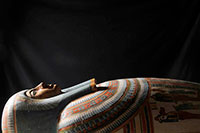February 10 - December 6, 2009
Members' Preview February 9, 2009

The Life of Meresamun: A Temple Singer in Ancient Egypt focuses on the life of a priestess-musician in Egypt in about the year 800 BC. The exhibit’s centerpiece is the coffin and mummy of Meresamun, who probably lived in Thebes.
The exhibit illustrates the duties of a temple singer and explores what her life was like inside, as well as outside, the temple. Her temple duties are illustrated by a selection of objects she would have used, including a sistrum, an ivory clapper, a harp, and cult vessels [11394, 10578]. Other objects document ritual activities that she would have participated in, such as animal cults and the consultation of divine oracles.
The section of the exhibit on her life outside the temple includes an examination of the social and legal rights of women in ancient Egypt and what professions were open to them. Examples of dishes, jewelry, and cosmetic vessels show what sort of objects could have been in her home. Religious rituals enacted within the home are illustrated by artifacts related to ancestor cults as well as amulets and other objects believed to improve fertility.
In preparation for the exhibit, the mummy of Meresamun was examined with a Philips Healthcare Brilliance iCT 256-slice scanner at the University of Chicago Hospital. The thousands of CT scans obtained during the procedure allowed the creation of detailed 3-D images and reconstructions. Linking that data with forensic science has allowed specialists to recreate Meresamun’s original appearance.
Purchase or download a fully illustrated exhibit catalog.
The exhibit is supported by Exelon and Philips Healthcare.
The Oriental Institute Museum is located at 1155 East 58th Street, Chicago. The Museum is open Tuesday, Thursday through Saturday from 10 a.m. to 6:00 p.m., Wednesday from 10:00 a.m. to 8:30 p.m., and Sunday from noon to 6:00 p.m. For information, call (773) 702-9514.
This exhibit supported by:


